The HP S700 And S700 Pro SSD Review
by Billy Tallis on September 7, 2017 9:00 AM ESTMixed Random Performance
Our test of mixed random reads and writes covers mixes varying from pure reads to pure writes at 10% increments. Each mix is tested for up to 1 minute or 32GB of data transferred. The test is conducted with a queue depth of 4, and is limited to a 64GB span of the drive. In between each mix, the drive is given idle time of up to one minute so that the overall duty cycle is 50%.
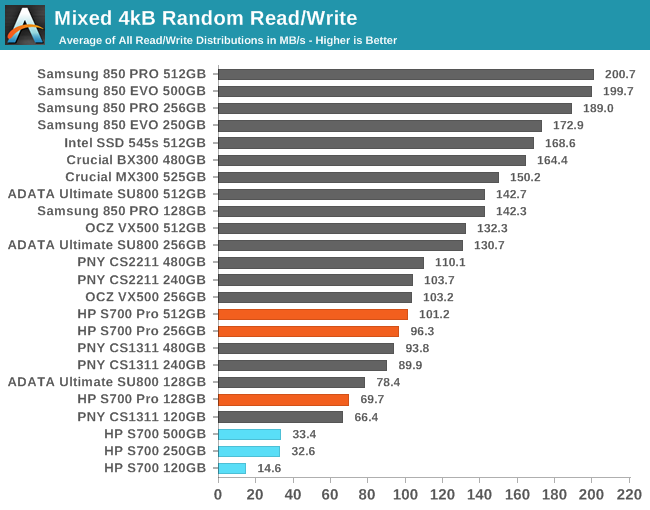
The mixed random I/O performance of the larger S700 Pros is below average, and also slower than the ADATA SU800 in specific. The S700s are the slowest of all, with the larger two offering half the performance of the slowest SSD with DRAM, and the 120GB S700 being less than half as fast as its larger siblings.
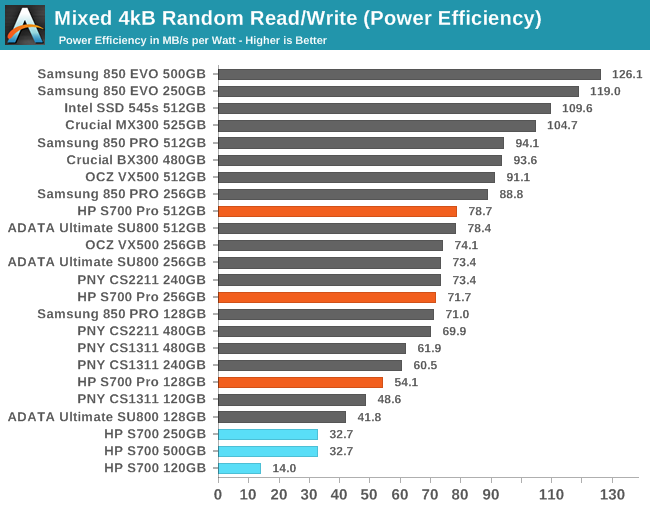
The power efficiency scores of the HP S700 aren't quite as bad as the performance scores, but it's still at the bottom of the chart and clearly worse than any SSD with DRAM. The S700 Pro is pretty efficient for a TLC-based drive, but is beat by the Crucial MX300 and Samsung 850 EVO.
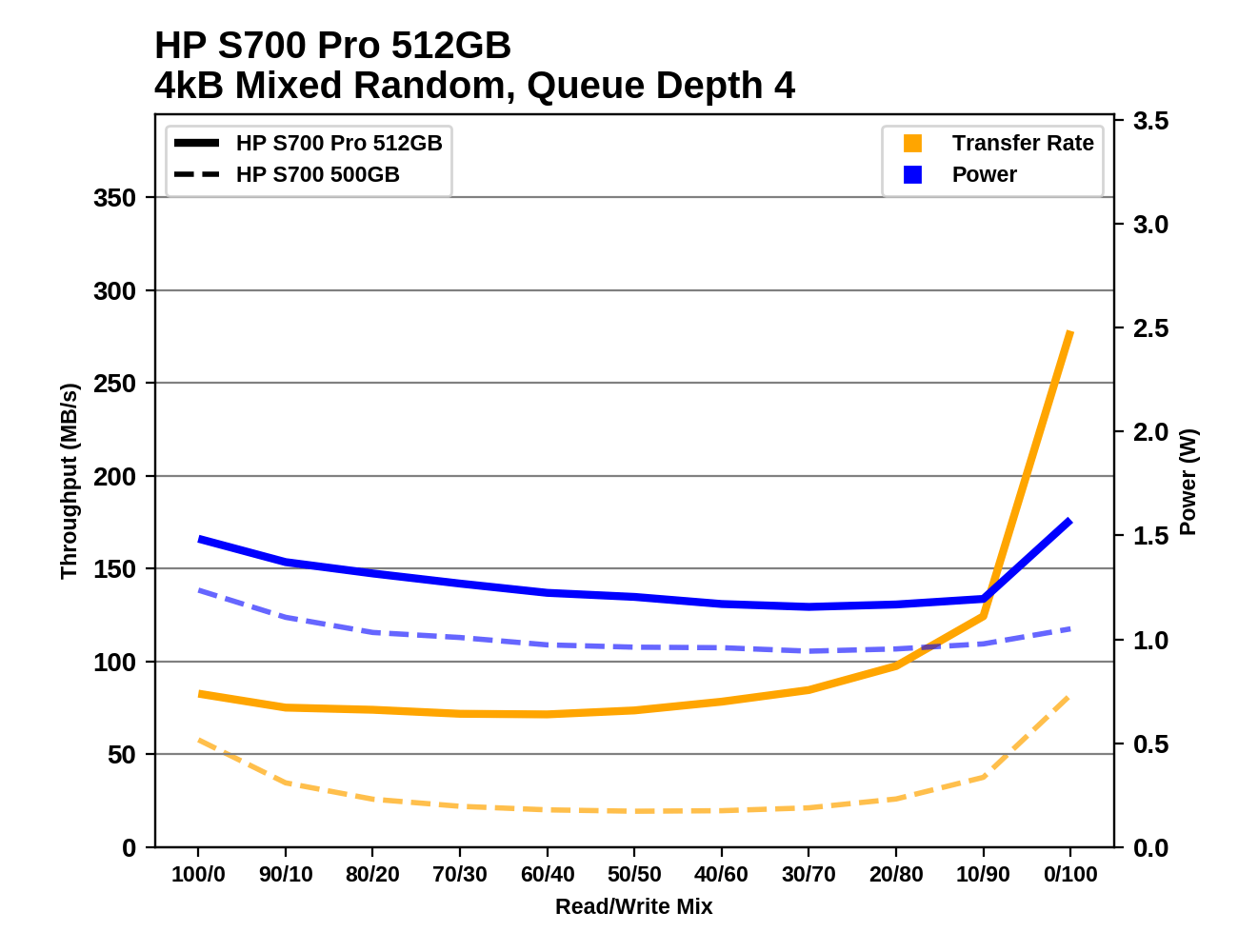 |
|||||||||
The performance of the S700 Pro only drops a little bit during the early phases of the mixed random I/O test, then rebounds gradually before spiking at the very end when every operation is a cacheable write. The 128GB S700 Pro runs out of SLC write cache space before the test is over and doesn't show the same peak in performance (though the spike in power consumption reveals the background work happening). The S700s start out slow, lose proportionally more of their performance in the early phases of the test, and only experience a small peak in performance at the end when every operation is a write.
Mixed Sequential Performance
Our test of mixed sequential reads and writes differs from the mixed random I/O test by performing 128kB sequential accesses rather than 4kB accesses at random locations, and the sequential test is conducted at queue depth 1. The range of mixes tested is the same, and the timing and limits on data transfers are also the same as above.
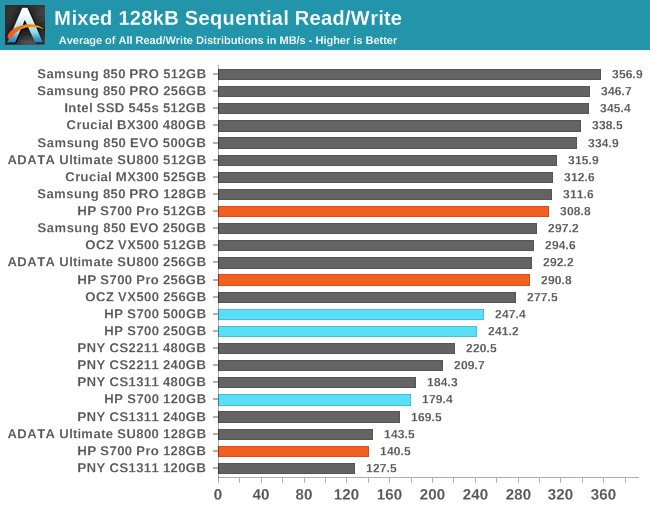
The mixed sequential I/O performance of the larger two HP S700 Pros is decent, and thanks to their great read speed the S700 isn't too far behind. The 120GB S700 scores significantly higher than the 128GB S700 Pro.
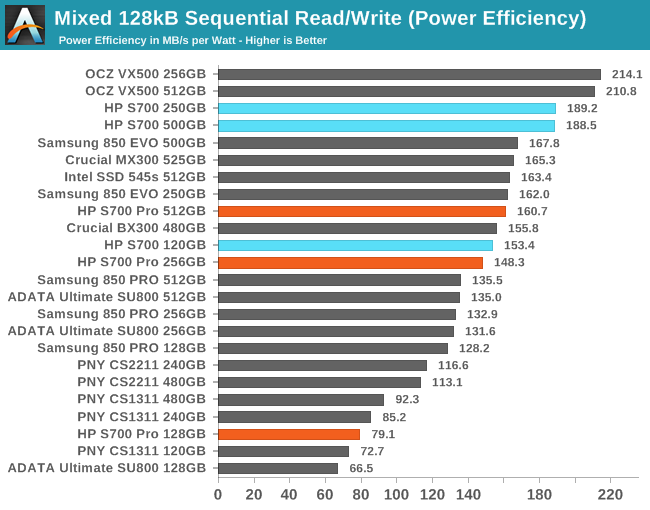
The power efficiency of the larger two S700s is great, but not quite up to the level of the OCZ VX500. The smallest S700 and the larger two S700 Pros are a bit above average in efficiency. The 128GB S700 Pro is near the bottom of the chart, but is more efficient than the SU800.
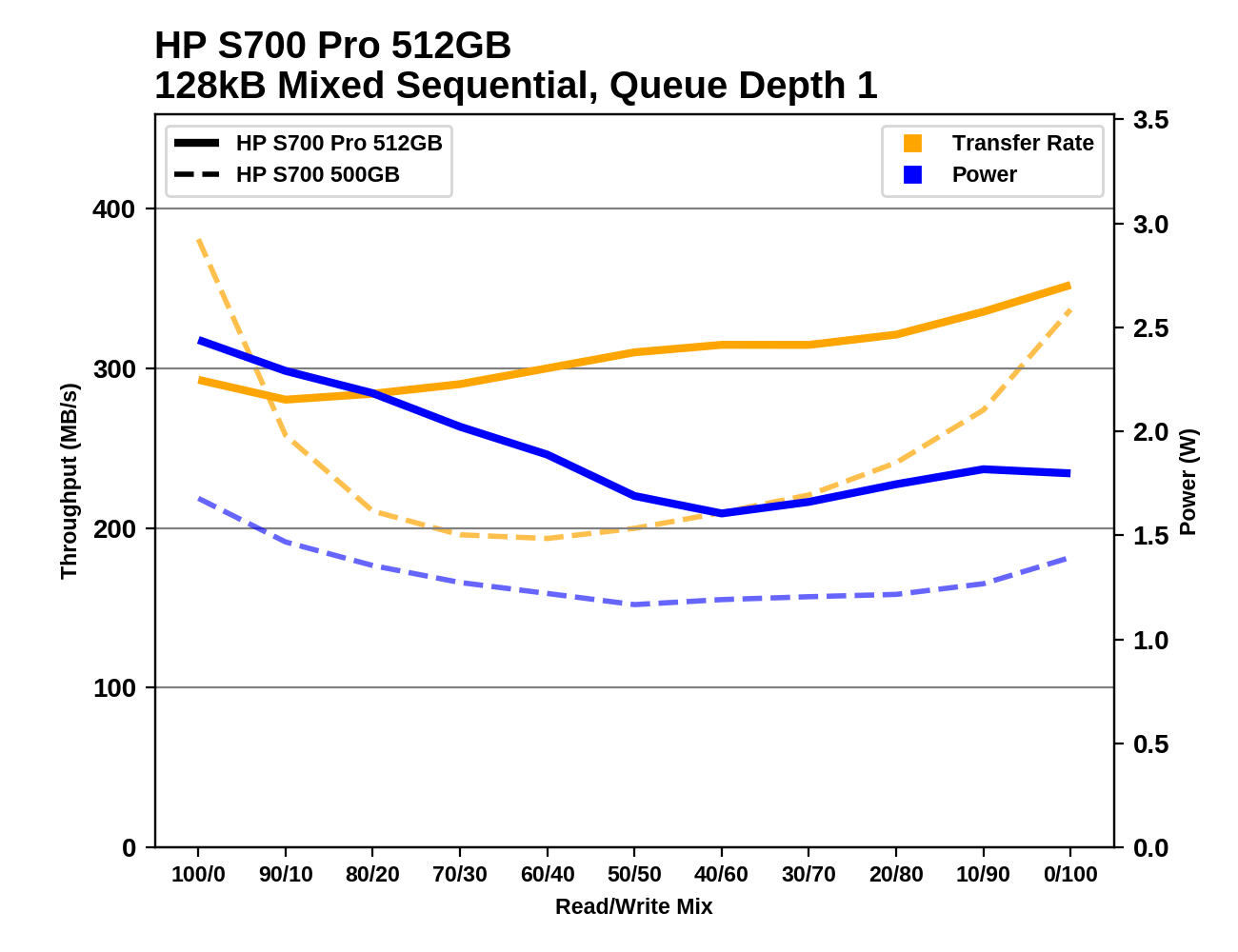 |
|||||||||
The larger two S700 Pros hardly lose any performance when writes are first introduced early in the test, and gradually speed up from there. The larger two S700s show a pronounced bathtub curve for performance, but they're fast enough at either end of the test that the overall performance is decent. The smallest two HP drives suffer from unsteady and low performance as they are performing garbage collection almost from the very beginning of the test.










54 Comments
View All Comments
sonny73n - Friday, September 8, 2017 - link
You should compare the 850 EVO with the BX300. I don't care whether the EVO has better controller but I will take a 2-bit per cell NAND over a 3-bit any day.mapesdhs - Wednesday, September 13, 2017 - link
I just keep picking up lightly used 840 Pro 256GB units, people have forgotten how good they were and still are. It's annoying they no longer appear in review charts. Even the Vertex4 and Vector are still good compared to modern models.barleyguy - Friday, September 8, 2017 - link
You seem to be comparing retail price to street price. HP has sales almost constantly. These might be $116 initially, but they'll be discounted very quickly to lower prices. I fully expect them to be competitive pricewise.r3loaded - Thursday, September 7, 2017 - link
Hurray, yet another 2017 SSD that gets utterly curbstomped by a Samsung SSD from 2015 on both performance and price.8steve8 - Thursday, September 7, 2017 - link
1. Who is buying SATA SSDs in 20172. Why is Anandtech putting so much effort into SATA SSDs in 2017
Billy Tallis - Thursday, September 7, 2017 - link
I've yet to hear from a vendor that their volume of NVMe drives has even come close to matching their volume of SATA drives, for either the retail consumer market or the client OEM market. Even in the enterprise market, NVMe isn't close to killing off SATA and SAS yet.We have new technologies launching in SATA products like the Intel 545s and Western Digital's 3D NAND SSDs. SATA SSDs are still more cost effective than NVMe SSDs, and will be until there have been plenty of low-end NVMe controllers like Phison E8 and Silicon Motion SM2263 on the market for quite a while.
Elstar - Thursday, September 7, 2017 - link
Also:1) most motherboards are still loaded with SATA connectors
2) most motherboards have few if any NVMe connectors (other than traditional PCIe)
3) SATA drives are often more friendly to "sneaker net" security.
8steve8 - Thursday, September 7, 2017 - link
yes, most motherboards have lots of SATA, but they also have a PCIe m.2 slot... hard to find one that doesn't.but who's buying SATA SSDs? It's an honest question.
on newegg i see a $99 240GB m.2 NVMe SSD, so who would recommend this 256GB SATA drive with a retail price of $169?
bji - Friday, September 8, 2017 - link
Nice straw man. Answer: nobody would buy either. They'd buy a $90 250GB Samsung EVO. I just did last night.cfenton - Monday, September 11, 2017 - link
Lot's of people don't have motherboards that support m.2. You're right that most new motherboards support m.2, but there are a whole lot of people out there with 2+ year old computers who might want more storage or a faster boot drive. SSDs, of any kind, still aren't common in many OEM products, especially at the low end. A SATA SSD is still going to beat the hell out of any HDD.